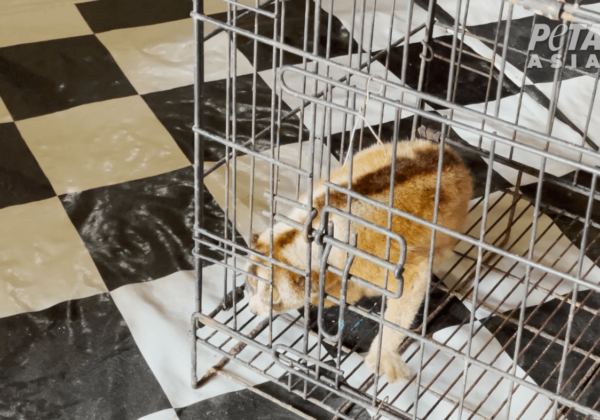UPDATE: All Orcas and Belugas Finally Free From Russian ‘Whale Jail’
Update: After over a year of public pressure, Russia’s “whale jail” has finally emptied its tanks.
On November 10, the Russian government released the remaining 50 belugas from prison cells into the waters of Uspeniya Bay. This action comes after pressure from organizations such as PETA, along with actor and activist Pamela Anderson and marine expert Jean-Michel Cousteau. In a letter written to Russian President Vladimir Putin shortly before the release of the whales, Anderson commended him for his efforts to free the animals, writing, “When all the dolphins and whales are swimming freely in the ocean rather than being confined for entertainment, Russia can rightfully take credit for protecting all cetaceans.”
After nearly five months, authorities have completed the release of all 97 orcas and beluga whales. https://t.co/zvpfEwsvTW
— National Geographic Magazine (@NatGeoMag) November 11, 2019
While this is the best possible outcome to a terrible situation, the animals’ immense suffering could have been avoided if they had never been abducted in the first place. The rest of the world needs to follow the lead of countries such as Canada, Chile, Costa Rica, and Croatia, which have all banned keeping cetaceans in captivity.
Originally published on June 26, 2019:
Update: Freedom is finally on the horizon for the 10 orcas and 87 beluga whales who have been held captive for months, some since last summer, in Russia’s Srednyaya Bay. Last week, the Russian government began moving eight of the 97 cetaceans. All 97 animals are expected to be returned to the Sea of Okhotsk (approximately 1,100 miles away from the “whale jail”), where they were originally captured. Charles Vinick, executive director of the Whale Sanctuary Project, provided Russian officials with advice from an international team of scientists on the best way to transport the animals without harming them. “While they are not able to follow all of our recommendations, we hope they can follow as many as possible,” Vinick told the BBC.
For nearly a year, 96 captured belugas and orcas have been held in small sea pens. Now authorities say that over the next four months, they will all be returned to the point of capture—1,100 miles away—and released https://t.co/OOLkSEYbCq
— National Geographic (@NatGeo) June 21, 2019
The news comes months after PETA and its affiliates, The Whale Sanctuary Project, conservationists, directors, and actors, including Pamela Anderson, urged Russian President Vladimir Putin to rehabilitate and release the animals back into the open ocean. “Thank God things have started moving,” Putin reportedly said last week during a televised phone-in. Had the Russian president heeded our plea last year to call off the cetaceans’ initial capture, there’d be no need to coordinate their release now.
“Will you ensure that Russian orcas and beluga whales are protected and halt plans to take them from the Sea of Okhotsk?” Anderson asked Putin on behalf of PETA U.S. in an urgent letter sent one year ago.
Although we’re pleased that Russian officials are now freeing these animals from their “whale jail,” they shouldn’t have been captured in the first place.
According to Russian Deputy Prime Minister Alexei Gordeyev, the country hopes to learn from its “whale jail” disaster—the Russian government has plans to clamp down on a law that allows the capture of cetaceans for “educational and cultural purposes.”The change would mean an end to the Russian commercial trade in cetaceans.
Originally published on April 10, 2019:
Great news! Relief is coming for the nearly 100 whales and orcas who have been held captive for months, some since last summer, in Russia’s Srednyaya Bay. After pleas from dozens of celebrities, conservationists, and members of the public, Russia signed an agreement today with a group of international scientists, including Jean-Michel Cousteau, to release the mammals back into the wild. Scientists have committed to developing a release plan for the whales by next month.
The agreement includes the construction of a special rehabilitation facility for the whales that will mimic their natural environment and act as a treatment facility for any of the injured or sick animals.
Original post published March 19, 2019:
Time is running out for more than 80 beluga whales and 10 orcas who are being held captive in Russia’s Srednyaya Bay. And a dedicated group of actors, directors, and conservationists have had enough.
UPDATE on the captive orcas and belugas being held in Russia’s #WhaleJail. Read more on today’s Instagram post: https://t.co/BvXHS101h8
Photos: Yuri Smityuk / TASS#DolphinProject #DontBuyATicket⠀#FreeRussianWhales #океанариум #москвариум ⠀ pic.twitter.com/iw6UM1Dkdp
— Dolphin Project (@Dolphin_Project) March 5, 2019
“We cannot stress enough that the lives of these whales are in danger, and they need immediate help,” reads a letter sent to Russian President Vladimir Putin signed by over 30 members of the entertainment and environmental communities. While orcas can travel up to 140 miles a day in the wild, this group of captive cetaceans has been imprisoned in severely crowded cages that are, at most, 27 meters long by 15 meters wide since last summer.
This ongoing story has captured the attention of advocates across the entertainment industry as well as famous conservationists and philanthropists. Actors Pamela Anderson, Holly Marie Combs, Adrian Grenier, Kate Mara, Edward Norton, and Maisie Williams—who has spoken out in the past against SeaWorld’s captive-cetacean programs—have all signed their names in support of these animals’ right to live freely. Directors Gabriela Cowperthwaite and Louie Psihoyos, who advocated for captive marine mammals with their documentaries Blackfish and The Cove, as well as primatologist Jane Goodall and marine expert Jean-Michel Cousteau have also signed their names in support of the efforts to return these whales to the ocean.
This is not the first time that honorary PETA U.S. director Pamela Anderson has reached out to Putin about this issue. In the summer of 2018, she urged him to call off the initial plan to capture these wild animals, which would subject them to a miserable life in captivity. The whales’ plight also received significant attention after actor and environmentalist (and Beyond Meat investor!) Leonardo DiCaprio tweeted his support for their release.
Please sign this petition and join me in speaking out against the inhumane capture of orcas and belugas in Russia. https://t.co/OED9zJ9fnz
— Leonardo DiCaprio (@LeoDiCaprio) February 26, 2019
In addition to asking that the animals be released back into the Sea of Okhotsk, the letter requests that the government give them more space to swim and to address the temperature and stagnation of the water to prevent ice buildup while they remain in these holding cells and notes, “These steps are critical for the whales’ survival.”
“THIS IS AN IMPORTANT MOMENT FOR RUSSIA ON THE WORLD STAGE. THE WORLD IS WAITING FOR A HAPPY ENDING IN THIS TRAGIC AND UNFORTUNATE SITUATION.”
Animals already being held captive at marine parks here in Asia need your help. Please don’t visit marine parks, zoos, or aquariums because as long as people continue to buy tickets, animals will continue to suffer.








